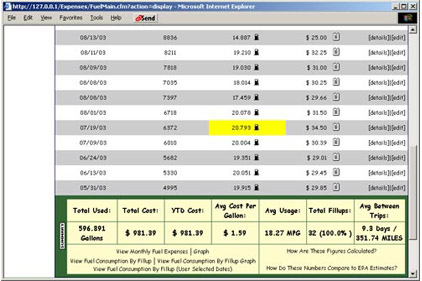Fortunately, new Internet-based software programs and tools make it much easier for HVAC contractors to access and update records and perform other fleet management tasks. These programs can track maintenance cycles and generate reminders, maintain expense logs related to both planned and unplanned maintenance as well as accident incidents and repairs, warranty information, fuel use and mileage, and more. With these components of fleet management automated, HVAC contractors are free to focus on their core business.
Of course, there is a variety of on-site tools — from dedicated programs to Excel spreadsheets — that assist with fleet management. However, an increasing number of firms are realizing that an Internet-based format is much more valuable.
With these solutions, companies pay a fee per company, per vehicle or per user. Data is maintained and stored securely “in the cloud” (on Internet servers hosted by the program provider) where it can be accessed anytime, anywhere. Some of the tangible benefits of using cloud technology to manage fleets include:
Mobility: One of the great enablers of cloud technology is mobility. Many providers offer mobile apps that let field personnel enter data on their phones, from which it is uploaded directly to the fleet management solution. Many solutions also offer mobile alerts that remind fleet vehicle drivers to have regular maintenance performed.
Portability: With a cloud-based fleet management solution, personnel can access records whether or not they are in the office. For example, an Internet-connected office worker out sick for the day could view and process mileage and expense logs from home. Furthermore, in locations where storms knock out power for days, workers can access and record data from any Internet connected device — even their mobile phones.
On-Demand Document Management: Cloud-based solutions also provide near-instant access to important documents. With a cloud-based solution, for example, remote record retrieval lets employees pull up warranty records or maintenance receipts on their mobile devices if needed during a visit to a service shop.
On-demand record retrieval also lets field personnel take advantage of specials and deals. For example, if a van is getting an oil change and the provider is offering reduced-cost tire rotations with each one, the driver can check to see when a tire rotation is due. If it is soon, he or she can take the deal and save the company money and time.
Permanence: With cloud-based technology, HVAC contractors don’t have to worry about data backup or paper record tracking. Anything entered or scanned into the system is retained on the hosting firm’s servers for easy access, at any time. Many firms offer a local backup option, as well, which is important if the HVAC contractor changes providers.
Vehicle Tracking: Some fleet management solutions offer vehicle (or mobile phone) tracking with GPS chips automatically updating the cloud-based solution. This feature enables office personnel to update customers when they might expect a technician to arrive at their home — and to receive notification when a vehicle is stuck in traffic or delayed for some other reason. Some can also assist with routing to ensure drivers take the fastest routes.
Expandability: With a cloud-based fleet management solution, HVAC contractors may be able to expand the data pool to include valuable information from trusted partners and suppliers. Data and information feeds from leasing companies, fuel management operators, and insurance firms and other vendors can be automatically uploaded to and processed by many systems.
That information — paired with mileage, expenses, working hours, and other information provided remotely by field personnel — gives HVAC contractors a more accurate and holistic view of the cost and efficiency of their fleet operations.
Increased Efficiency: Finally, cloud-based fleet management systems enhance accuracy and save time. When field personnel can enter (and in some cases, scan via mobile phone cameras) data as they work, rather than keeping written logs, receipts, and other paperwork to hand off at week’s end, the information is processed in a more timely manner and error rates are reduced. It also streamlines processing, turning a two- or even three-step solution into a single operation.
And, for companies that currently have no fleet management solution in place, moving from a world of interconnected spreadsheets to a centralized fleet management system provides a real productivity boost. Ownersite customer Wolf Creek Air Conditioning, for example, has seen the benefits in action.
Susan Hogan, the firm’s office manager, reports that having cloud-based records helped the firm quickly locate a vehicle warranty after an unexpected equipment failure. She said the solution also helps with compliance. “Texas requires regular inspections of fleet vehicles,” said Hogan. “The reminders help ensure our drivers get inspections done and the vehicle stickers don’t get out of date.”
Finding the Right Solution
There are a number of cloud-based fleet-management solutions available, and their functionality varies widely, so it’s important for HVAC contractors to know what features matter most to them. Vehicle records and maintenance management, including insurance, warranty information, mileage, and fuel expense, is a feature many firms find fundamental to achieving the productivity and efficiency gains discussed here.
However, beyond features, there are a few other questions you should ask of any cloud-based provider, whether you are exploring them for fleet management or something such as inventory tracking or customer relations management.
1. Is the solution user- and vehicle-friendly?
Although the ability to import digital information or scan receipts and records is important, it is equally valuable for the system to make entry as easy as possible. For some less-sophisticated users, manual input is the only method with which they will be comfortable, and you may experience resistance if you ask them to master too many new skills.
Also, having a product built from the ground up for vehicles, with ample vehicle-specific fields, views, and reports, will save implementation time and reduce headaches as compared with trying to adapt a generic operations management solution. If you have unique needs, ensure your solution covers them or confirm whether the provider will tackle customizations.
2. Can you perform long-term reporting and data analysis?
Fleet management solutions are short-term miracle workers and long-term friends. Being able to track data over time lets you analyze fuel efficiency and usage, see failure patterns out of line with industry expectations, and extract other long-term views and reports that provide valuable information.
3. Can the system import and export information?
If your records are stored digitally, whether in Excel, QuickBooks, or some other program, make sure you can import and integrate that data. Similarly, exporting to an array of formats is important for tax purposes, regulatory compliance, and other data reporting requirements.
Publication date: 03/05/2012









